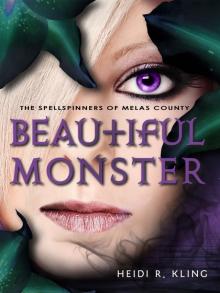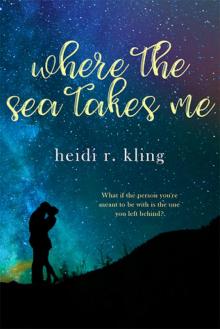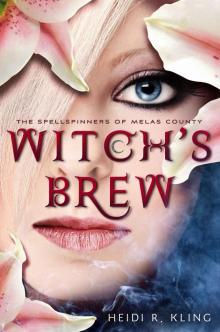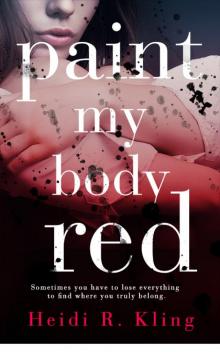- Home
- Heidi R. Kling
Paint My Body Red Page 3
Paint My Body Red Read online
Page 3
“Oh, will we? You’re awfully confident.”
“You just forgot who you are, that’s all.” He takes his eyes off the bumpy road and catches mine before looking back to the road again. “Don’t worry, you’ll remember soon enough.”
“I’m many things,” I say, sarcastically, “but I’ll never again be a cowgirl.”
“Never say never,” he says.
His words linger in the air, making me suspect he might know more about me than he let on.
Chapter Three
I wasn’t expecting this.
The ranch I remember—with its teeming clots of roughnecks tangled up in the mud, kids scurrying about, barbeque wafting hot meat on an open fire, and people—people everywhere: joking, roughhousing, squealing—this isn’t that place. As we pull up to the ranch the only sounds I hear are the roar of the Jeep’s engine lulling to a halt and a lone horse in the center of a beat-up corral neighing into the dry, soft wind. The quiet is so eerily strange, I half expect tumbleweeds rolling by.
“Where is everybody?” I ask Jake, who, in a flash, has pulled the key from the ignition and is on my side of the Jeep, opening my door for me.
Jake’s shoulders soften and a frown crosses his strong brow.
“Where are all the staff and the guests?” I ask. “Oh, are they on an overnight?” Once per ranch stay, some of the cowpokes take guests on a covered wagon ride up to the mountain top overlook where they can wrangle up cows and sleep under the stars.
Jake extends a dirt-stained hand, offering to help me out of the Jeep. I take it but only for a second. His hand is long-fingered and rough but has a soft strength that fits around my smaller hand like a cocoon. I let go as soon as my flip-flops hit the dirt.
That was the longest I’d let anyone touch me since Ty.
Jake glances down at my feet with an amused expression on his face as the dust puffs up around my freshly painted toenails. Mom’s send-off: a mother-daughter mani-pedi. A cool eucalyptus towel and a fresh coat of red polish fixes everything, right? Especially when Zen music is playing overhead.
“I don’t have any other shoes,” I say.
“I didn’t say a word,” he drawls. “But we can fix that later.” He holds my eyes a little too long, and I feel that flush again. He blinks. Did he feel it, too?
I swallow away any inappropriate thoughts.
“At any rate,” he says, as if clearing the air, “you better just come on in.” He grabs my suitcase out of the back. Flipping it sideways, he tucks it under his arm like it weighs less than a Kleenex box. Like it doesn’t have wheels and a handle and was meant to roll wherever you needed to take it.
But still…I can’t remember anyone at home ever offering to carry my suitcase. Never mind doing it without asking.
It’s a little too endearing.
“Thanks,” I say, “I can get that.” I reach for the suitcase and our fingers brush. Flustered, I pull away. Jake must think I’m nuts.
He glances at my dusty feet again and shoots me an amused look. “What, and risk dirtying up those pretty toes?”
Pretty toes. Is he making fun of me or does he mean it?
Then I realize what I’m standing on.
Circles of mosaic cement lead from the drive to the porch, and the first one is my own. A little girl’s handprint, painted blue with a yellow dove in the center: PAIGE AGE SIX. I can’t fight the feeling that I’m going to break it, so I step around the other ones until I’m walking over cracks corroding fingers indenting round stone: Papa’s, then Gran’s, then Uncle Joe’s, then Dad’s. I stop at Mom’s, surprised Dad kept it here: her long-fingered hand in yellow paint, daisy leaves pressed into the palm. I still remember her laughing that day, braids in her hair, yellow paint smeared across her cheek. I remember Dad teasing her for not liking to get dirty, and instead of scowling and snapping at him—that would come later—she just waved his comment away with a smile.
“I apologize for them being so run down,” Jake says. “I haven’t got to it yet.”
I press my palm into hers. Our hands are now the exact same size, and I suddenly miss this version of my mom so much my heart lurches and tears pop into my eyes. I swallow hard, pushing them away. “You’re going to fix them up?” I look up at this cowboy now carrying my suitcase over his shoulder like it’s a saddle.
“You bet. Do it every year after the snow melts.”
I blink.
He doesn’t.
“Why?” I ask.
“You don’t remember me, do you?”
I’m searching for something recognizable in those ridiculously blue eyes when the heavy wood door swings open and a strange man, thinner, more pale than me, rolls out onto the porch. A button under his right finger propels his wheelchair forward.
Two microphone shaped pieces of black foam hold up his head. Plastic tubing snakes from his neck down his chest, and from that, springs more tubing, thinner lines that disappear under pearl buttons on his red and blue plaid shirt. His legs are what shock me the most. Covered in baggy grey sweats, they look like two floppy seals, dangling on metal footrests.
I suck in a breath. It’s not a strange man. It’s my…father.
This man, whose facial features resemble my dad’s—if you sucked the muscle and blood right from under his skin, if you watered, and then lightened his blue eyes to the shade of an abandoned winter’s bird bath, if you took away everything about him that once was, that he used to be—mumbles something incoherent.
I had no idea. I had no idea things were this bad, that he had deteriorated this drastically.
Jake’s hand rests on my daddy’s shoulder. “He says it’s okay, Paige. Don’t be scared.”
Say something. Move forward.
But I can’t move. I can’t say anything. I stand there, frozen in place, on Mom’s yellow handprint like I’m the one unable to move on my own.
“Hi, Daddy. How…are you?” I say. Choking on my own words, I look to Jake, suddenly understanding everything: the look on the gift shop clerk’s face, Jake’s comments about the ranch, why this place is a ghost town, Mom’s insistence to send me here this summer. “This is why he only emails, never calls? He can’t…”
Talk anymore.
I knew he was sick—but it was a long-term disease. The last time I saw him he was still walking, talking. He just had a slight tremor in his hand. That’s it. And why isn’t he wearing jeans? The only time I’ve seen my dad in something other than jeans was at Papa’s funeral. I latch onto that image, floundering for something to say.
I feel Jake’s eyes on me. He doesn’t want me to say anything else. I’ve already said enough. I look back at my dad.
“Thanks for your emails. I’m…it’s so good to see you.”
My dad might be everything Mom accused him of: neglectful, self-centered, alcoholic—but standing here, one thing is absolutely certain. Whatever my father is, or had been before, I am a terrible daughter.
“Paige.” Jake’s look tugs on me like I’m a stubborn fish he’s trying to drag in. I push back, not wanting to see the truth in his eyes. Not wanting to stand here on this stupid handprint, not wanting to acknowledge this ghost who used to be my dad, or the ghosts that chased me here. I want to disappear. I want to clamber back into the Jeep and get on an airplane heading toward anywhere, but Jake doesn’t let me get away. He keeps pulling.
I follow them into the living room where the giant moose head, named Freddie, still hangs over the river rock fireplace. Vaulted ceilings made of huge, heavy beams—strong enough to hold back piles of snow each winter—arch above the L-shaped couch, where Native American stitching tells the long-ago story of a herd of buffalo running across a golden prairie. The same pea-green crochet throw blanket still sprawls over the back.
On the left hand corner of the left hand cushion closest to the door, I plop down, awkwardly. This room used to smell of dust and cigars. One look at the humming machine pulling alongside Dad tells me he isn’t smoking anymore. A hint of strawberries in the air
replaces the cigar scent; a sterile lemon cleaner smeared on the tree stump coffee table replaces the dust.
Jake speaks to my father in a low, soothing voice as he parks him by the well-worn leather recliner next to the river rock fireplace. Easily lifting my father from his wheelchair, he settles him onto the leather chair like he’s a small child. The muscles in Jake’s arms don’t even strain under the weight. Dad must weigh even less than me.
I yank my silver ring up and down on my middle finger, nervously. Under the silver, a mold-colored ring band stands out against my pale skin. Mom warned me not to buy cheap jewelry, but I couldn’t resist it early last year when my friends and I were shopping on the coast. That seems like forever ago.
I glance over at my dad who is staring straight into the unlit fireplace. Jake kneels beside his wheel, confidently busying himself with Dad’s tubes and wires like it’s second nature. He’s saying something to him, something too low for me to hear. Now he’s walking over to me.
“Come on into the kitchen and help me get some tea, will you?”
I jump off the couch like its coils sprung me off.
Jake stops short halfway down the dimly lit hallway, and I crash into him in an awkward way that sends unwelcome heat up my arms. He steadies me with a strong hand on my elbow and says in an insistent whisper, “You talk to him, Paige. He can hear you same as I can. His body is fading, but his brain is perfectly intact. You can’t have him thinking you’re afraid of him, of the way he looks.” His eyes dart away before he says, “He’s afraid enough as it is.”
He loves him. Jake loves my dad. I can tell. Why can’t I remember this sweet cowboy? It’s like everything good in my memories has been washed away by everything bad at home.
I fight away tears. “I’m sorry. It’s…I don’t even know him, anymore. Not really.”
He shakes away my words like they’re ridiculous. “He’s your father. Of course you know him.” His eyes steady me. Why do they have to be so, so blue? It’s like he can see into what’s left of my soul and is trying to rescue the remnants.
I suck in a breath. He’s standing so close to me. The soothing cadence of his voice makes me feel pangs of emotions I haven’t felt in a long time. Safe. Heard.
Why does it have to be so dark in this hallway?
He sucks in a deep breath, as if steadying himself, too. “Don’t be sorry, Cowgirl,” he says, softly. His words are harsh, but his voice is kind. “And don’t make excuses. Not to me, not to yourself. Excuses don’t work here on the ranch, remember? Just do better.”
Remember.
He knows me. From before.
Something clicks, and just like that I remember him.
The river hole was crowded with kids, some splashing around on the sandy bank, some rock skimming on the silver river. A few of the older boys cast fly rods in a fluid motion that reminded me of the ballet. I wandered from the beach and scampered over rocks to watch them. One of the boys’ daddies worked at the ranch, and I recognized the boy as someone who helped lift the bales of hay from the back of the green truck into the barn.
The boy knew how to work like any other ranch hand, but the way he reached back over his left shoulder and cast the fly rod out over the river was a whole different image of loveliness. I was ten years old, and I told him so.
“The ballet?” The boy looked at me like I’d requested he put on a pink tutu and pirouette. I’d meant it as a compliment. Now I was squirming and picking at a scab, feeling all kinds of awkward.
“It’s just so pretty.” I was too young to even blush.
His blue eyes scrutinized. “You sure you’re one of the Mason clan?”
I nodded. “But I don’t live here year round.”
His eyes lit up with teasing. “Don’t have to tell me, Cowgirl.”
I didn’t like being teased. “I might not live here, but I wish I did.”
Now his eyes were curious. “Why don’t you then?”
“My mom moved us away two years ago.”
“Why so?”
I was a bit embarrassed to tell him why. All the reasons Mom shouted when she and Daddy were arguing.
I want more for her than I had, Gus. It’s fine for her to mess around with horses a few weeks out of the summer, but a life on a ranch is no life.
“My mom likes the city,” I said.
He caught a bite. Instead of making a production out of it like fishermen in movies, he gently reeled it in. A big one, too. Rainbow trout. It flopped around at the end of that line like nobody’s business.
“It’s a native,” he said, proudly.
“How do you know?”
It squirmed in his hands as he told me how he knew. “The rainbow is more profound and more beautiful. See, it’s darker here, which creates better camouflage in the water. It mimics the granite on the bottom of the stream. Look at the fins on this guy. They’re like wings. On planted trout, the fins are stubs on account of their rubbing against the sides of the cement tank all day.”
I thought the life of a stocked fish sounded downright awful and told him so.
He seemed to agree, going on with more praise about the natives. “Planted trout are silver, like a salmon. See how strong this guy is? How he’s fighting me to get back into that river? This guy’s a survivor.”
I was confused. “Then why are you still holding him out in our air watching him gasp for breath?”
He glanced at me sideways and, with a spark in his eye, unhooked his mouth. Like a magician tossing a dove into the air, he tossed the native into the rapids. We watched him disappear under the clear water.
“I can’t see him anymore!”
“Whaddit I tell you? He’s camouflaging right back into the Snake.”
“But what are we supposed to eat over the fire tonight?”
“Steak?” he said. “It ain’t right to keep a native fish. They work so much harder to survive. They survive the winter, while the plants can’t.” He scrutinized me. “I’m surprised your daddy didn’t tell you any of this.”
Daddy sounded like dad-ay from this boy’s lips.
“Why?”
And this is why I recognized him from that look on the porch.
On that riverbank seven years ago, twelve-year-old Jake looked at me up from that spinning reel, from winding in that near-transparent fishing line, and drew me right in, too.
“Your daddy’s the one that taught me.”
Chapter Four
“It’s you,” I say to Jake, dumbfounded. “The boy I offended by likening his fly fishing to a ballet dance.”
“I’m still offended,” he says with a grin.
I remember him.
“Wow.”
Pause.
“Sorry I didn’t recognize you.”
“Not a problem,” he says. “It’s been a long time.”
“Why didn’t you say something?”
“Wanted to see if you’d figure it out.”
I shake my head.
He smiles, pleased with himself. “Now go on in and greet your dad,” he says with a slight tip of his head. Out of anyone else’s mouth, his words would sound bossy. They aren’t. He makes them sound sweet, with just the right push.
“Hi, Dad,” I say as I re-enter the room for my retry.
I stand by his chair under the framed panoramic watercolor of the Grand Teton my grandmother painted years ago. I make sure to stand where he can look right at me.
His brain is exactly the same. His brain is exactly the same. His brain is exactly the same.
“I’m so sorry it took so long. For me to come,” I say. “I…it’s not an excuse. But I didn’t know. How sick you were, I mean. No one told me.” I’m doing what Jake told me not to—I’m making excuses.
His eyes are watery. Mine are, too.
Tears pool in my eyes, slip down my cheeks. There’s no way I can make up for the time we’ve lost. This is on me. I want to run. Just like I’ve run from everything the last few months. I want to run more than a
nything.
But I stay.
Reaching out tentatively, I lay my hand on his. Under my weight, his fingers flutter like a butterfly struggling for flight.
Chapter Five
Nightly supper on the ranch used to be an occasion. Not in the same way a dinner party is back in California where it’s more about the age of the French wine and the popularity of the caterers, but an occasion to sit and rest, to be together, and most importantly after a long day, to eat. On the ranch, you work up an authentic, organic hunger unlike any pangs I’d had in the California.
“All that fresh air, kid. Hard work builds up an appetite,” Dad would say, patting my tiny back like I was a ranch hand as he strutted through the door at the end of the day. Face flushed with hard sunlight, hands crusted with dirt, he’d lift his hat off his brown cowboy head, set it on the porch swing, and wipe dusty sweat off his brow. I’d pluck a piece of straw off his jeans, and he’d know just what that meant. “I’ll be sure to wash up before supper.”
Mom didn’t like the smell of horses, which was unfortunate since we lived among a thousand head of them. He’d wash. I’d wash. And we’d share a steak. Tender and juicy and marinated to perfection, black grill-lines melted on my tongue, fresh corn on the cob dripped with real butter made from the barn cow’s milk, and the biscuits—warm and fluffy and soaked with gravy—were a culinary piece of heaven.
Now he sits beside me at that same weathered farm table, eating blended food through a straw, and I know I’ll get nothing down tonight. Jake sits across from me, which at turns flusters and confuses me. Does he always eat with my dad?
Then Dad makes a noise, little more than a moan, and Jake stands up and adjusts the straw in my father’s mouth. My father lets out another sigh-like noise, and Jake says, “My pleasure, Chief.”
My father’s lips turn up in a tiny smile, a quiver really, and I can tell it’s a major effort to move at all. I poke at my fried chicken, my mashed potatoes, and my green beans, only taking tiny bites when Jake raises an eyebrow at me.
Anna, the woman who helps my father, comes in from the kitchen wearing a waist-length apron over tight blue jeans. I welcome the distraction. The red nail polish on her fingertips is chipped and worn and matches the hand-embroidered strawberries on her apron. I watch the way her hand curves on my father’s shoulder, once so broad and mighty skimming the side of his front door after a day on the ranch, now so frail and bony it looks more like a bird’s wing. “You’ve hardly eaten a thing! Don’t you like my cooking?”

 Not Okay, Cupid
Not Okay, Cupid Beautiful Monster
Beautiful Monster Where the Sea Takes Me
Where the Sea Takes Me Witch's Brew - Spellspinners 1 (Spellspinners of Melas County)
Witch's Brew - Spellspinners 1 (Spellspinners of Melas County) Where I Found You
Where I Found You Paint My Body Red
Paint My Body Red